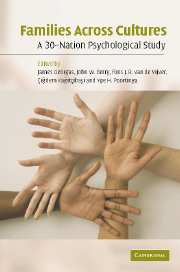Book contents
- Frontmatter
- Contents
- List of figures
- List of tables
- List of contributors
- Acknowledgments
- Prologue
- Part I
- 1 Families and family change
- 2 Cross-cultural theory and methodology
- 3 Theoretical perspectives on family change
- 4 Family portraits from 30 countries: an overview
- 5 Hypotheses
- 6 Methodology of the study
- 7 Results: cross-cultural analyses of the family
- 8 Synthesis: how similar and how different are families across cultures?
- Part II
- Appendix
- References
- Index
8 - Synthesis: how similar and how different are families across cultures?
Published online by Cambridge University Press: 10 December 2009
- Frontmatter
- Contents
- List of figures
- List of tables
- List of contributors
- Acknowledgments
- Prologue
- Part I
- 1 Families and family change
- 2 Cross-cultural theory and methodology
- 3 Theoretical perspectives on family change
- 4 Family portraits from 30 countries: an overview
- 5 Hypotheses
- 6 Methodology of the study
- 7 Results: cross-cultural analyses of the family
- 8 Synthesis: how similar and how different are families across cultures?
- Part II
- Appendix
- References
- Index
Summary
The study of the diversity of types of families and family change throughout the world during the past 200 years has largely been the province of family sociology and cultural anthropology, but more recently psychology and psychiatry have taken an active interest. The co-authors in this study are all psychologists and their primary interest is in the cross-cultural analysis of psychological phenomena. The design of the study was based on four hierarchical levels: ecological and sociopolitical characteristics of societies, family roles, family networks, and psychological variables. Thus, the project emphasized the study of the psychological variables of emotional closeness, self-construal, personality, family values, and general values and their relationships within ecological and sociopolitical features of societies, family roles, and family networks. The data from the countries of this project form a rich and complex mosaic of interrelationships across and within these four hierarchical levels.
The project has both a cross-cultural or comparative dimension and an indigenous dimension. The cross-cultural dimension is based on quantitative analyses of data from 27 countries, while the indigenous dimension reflects a qualitative analysis of cultural features of the 30 countries in the study, as well as descriptions of the relationships between the ecological and sociopolitical, family, and psychological variables by authors from these countries.
This chapter discusses three related themes that underlie the findings presented in Chapter 7. The first theme deals with how families differ in cultures across the world.
- Type
- Chapter
- Information
- Families Across CulturesA 30-Nation Psychological Study, pp. 186 - 240Publisher: Cambridge University PressPrint publication year: 2006
- 10
- Cited by



